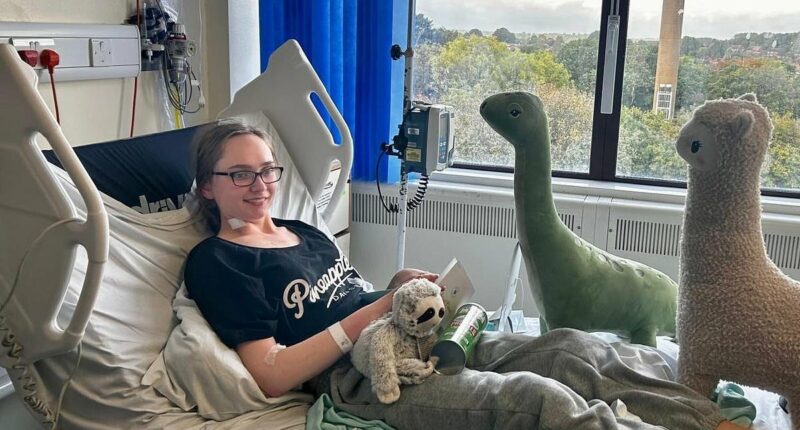Share this @internewscast.com
Just a day after going to sleep with a severe headache, Eliana Shaw-Lothian found herself in a medically induced coma, connected to a ventilator, as doctors tackled three life-threatening conditions while her parents clung onto hope.
Ms Shaw-Lothian’s brush with death came two years ago when she was an 18-year-old who had just started university.
The now 20-year-old was four weeks into her first term at the University of Surrey when she woke up one Friday with a ‘really bad headache’.
The next day Ms Shaw-Lothian was in hospital, battling against life-threatening bacterial meningitis.
Ms Shaw-Lothian, a psychology student from Bromley, southeast London, said: ‘The symptoms were pretty generic.
‘I used to get headaches all the time so it wasn’t unusual for me. I thought my hands and feet were cold because it was chilly in the flat.
‘And I thought maybe I had slept funny so had a stiff neck.
‘I was generally just feeling under the weather – like I had the flu.’

Eliana Shaw-Lothian contracted bacterial meningitis during her first term at university
That same night, Eliana reached out to her parents, mentioning that she felt sick. Her mother inquired if she had a rash, a common indicator of meningitis.
However, she had no signs of a rash and so decided to try sleep her illness off.
Ms Shaw-Lothian woke feeling sick in the early hours of Saturday and started throwing up repeatedly.
By this point, she had realised something was really wrong, but had become ‘delirious’ and was unable to act on her suspicions.
On the Saturday morning Ms Shaw-Lothian’s parents grew worried that they hadn’t heard from her and continually called her phone.
Ms Shaw-Lothian’s flatmates heard her phone ringing non-stop and went into her bedroom to check on her.
She said: ‘They found me in there delirious and picked up the phone to tell my parents who immediately drove to my uni.
‘An ambulance said it would take two hours to get to me so my parents and friends contacted campus security who took me to hospital.’

By the time Ms Shaw-Lothian made it to A&E a rash had appeared and she was hallucinating
By the time Ms Shaw-Lothian made it to A&E a rash had appeared and she was hallucinating.
She was quickly sent to the ICU where doctors administered treatment for viral meningitis, bacterial meningitis, and sepsis all at once, as they couldn’t delay while awaiting test results.
In an increasingly agitated state, Eliana was placed in an induced coma as medical professionals searched for brain fluid.
Subsequent tests confirmed she was suffering from bacterial meningitis, which is both less common and more severe than viral meningitis, guiding the medical team to focus on that specific treatment.
Her parents were told she was ‘in acute danger’ and that the next few hours were critical to see if she would respond to treatment.
It wasn’t until Sunday that Ms Shaw-Lothian, who was on a ventilator and feeding tube, started to show signs of fighting the infection.
On Monday lunchtime she was brought out of the induced coma.
She says her last memory was thinking she needed to go to hospital. She woke up in intensive care three days later.

The last thing she remembers is thinking she needed to go to hospital—she woke up in intensive care three days later
Ms Shaw-Lothian said: ‘Waking up was terrifying as at first I didn’t recognise my parents or know who I was.
‘I had no idea what was happening as I had been in an induced coma for two days.
‘But I later remembered my family and what had happened. I was then told I had bacterial meningitis and could have died.
‘That’s a feeling I’ll never forget.’
Following her close brush with death, Eliana faced difficulties with her motor skills, making everyday activities like eating and walking challenging.
She also struggled with hearing loss at the beginning of her recovery.
Ms Shaw-Lothian said: ‘As a dancer, those things were really hard for me to come to terms with. But eventually I returned to normal.
‘However now, two years on, I still have fluid around my heart and struggle with concentration problems.

A keen dancer, she is now able to enjoy her hobby again since fully recovering
‘But I’m so grateful because I know there are so many people who had meningitis who aren’t as lucky.
‘People are left with brain damage or can lose their limbs – or of course even their lives.
‘So the fact that I’ve been able to return to university and dancing and live my life as normal… I’m so grateful.’
Ms Shaw-Lothian’s experience has made her determined to raise awareness for meningitis and ensure people know the early signs and symptoms.
She is now working with Meningitis Research UK and is keen to share her story ahead of Freshers’ Weeks so students can be prepared for how to cope if they or one of their friends falls ill.
Ms Shaw-Lothian said: ‘My advice to freshers would be first, to make sure you stay in contact with a parent, sibling, friend, or loved one.
‘My family and flatmates are the only reason I’m here today.
‘Because I had been in contact with my parents, when I didn’t message them, they knew something wasn’t right.

Ms Shaw-Lothian with her father, who along with her mother, kept calling her the morning she was hospitalised
‘And thankfully I was friends with my flatmates so they felt comfortable enough to come into my room to check on me.
‘Secondly, I’d say don’t hesitate. Meningitis can kill in hours. If you or a friend has symptoms but you’re unsure it’s meningitis, go to A&E or at least call 111.
‘It’s better to find out it’s not meningitis than to have left it too late.’
A spokesperson for Meningitis Research Foundation encouraged students to get vaccinated before going to university.
Ms Shaw-Lothian had had the MenACWY vaccine but it did not protect against her strain of meningitis.
Caroline Hughes, Support Services Manager at Meningitis Research Foundation said, ‘Meningitis can affect anyone, anywhere, at any time.
‘However, students are at an increased risk. The most important thing they can do to protect themselves and their friends is to get the free MenACWY vaccine before starting university.
‘It’s vital for everyone to be aware of the symptoms of meningitis, as the MenACWY vaccine does not protect against MenB—the most common cause of life-threatening meningitis in young people.
‘In the early stages, meningitis can look like a bad hangover, freshers’ flu or other mild illnesses, which makes it easy to miss.
‘Symptoms can appear in any order but not everyone gets all symptoms. You must trust your instincts and seek urgent medical attention if you think someone is unwell.’














